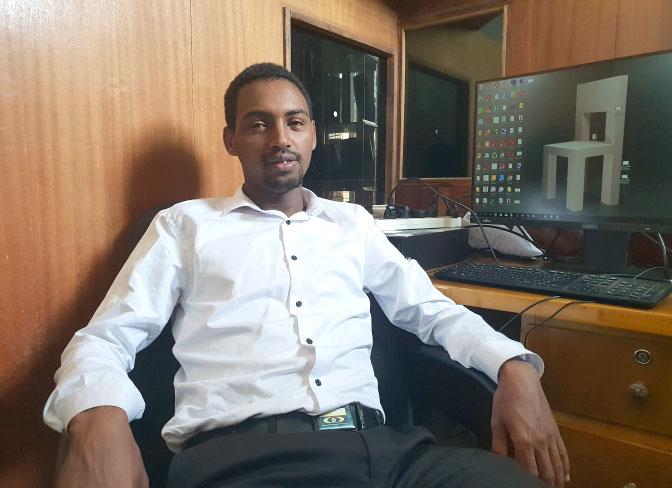Africa-Press – Eritrea. He is a very ambitious young man, and his time management is exemplary. Many of his friends and coworkers admire his creativity and firm belief in teamwork, a quality that attracts people of all ages to work with him. His knowledge and respect for his job is visible in the software programs he creates, especially his new project “Kebhi”.
Thank you for making time and accepting our request to interview you. Please, introduce yourself to our readers.
My name is Engineer Filimon Tesfamariam. I was born in 1992 in Adi Keih and went to school there upto second grade. But due to the border war with Ethiopia my whole family had to move to Asmara. I continued my elementary school in Adi Segdo, and did middle school at Hadnet and secondary school at Keih Bahri. I went to Sawa with high expectations of attaining high grades in the matriculation exam because students with high grades were given laptops and I was dreaming of owning one. My dream came true when I got 3.8. I was awarded a laptop. When I joined the Institute of Technology at Mai Nefhi, I chose to study computer engineering to satisfy my lingering desire to be a software programmer.
Was it your childhood dream to be a software programmer, and if it was why?
Like most kids I wanted to be a doctor. Although as a student I was not a prize winner, I had great interest in reading. My neighbors who always saw me reading for long hours used to call me the “kid doctor”. In high school I started watching Hollywood movies and video games. The visual effects and what I saw on the screen fascinated me and that’s when I wanted to be a programmer. I was familiar with how desktop computers work but I didn’t have a laptop, and so I didn’t know how it worked. In fact, my first experience with a laptop was at the Expo annual festival. At a presentation, I saw a laptop connected to a projector, so I fearlessly went to it and started to press keys at random. It was fun for me but the presenter was annoyed. Anyway, in my freshman year I took extra courses on how to fix electronic equipment and soon began fixing fellow students’ laptops and phones.
Right after graduation, in 2016, I was assigned to work at EriTel, and with the confidence I built in college repairing laptops and phones, I rented my own electronic shop and officially became a technician. Now that I am so busy with programming the shop is run by my family, especially my younger brother who has become a good technician.
We heard you have created a lot of application soft wares; tell us about them?
Yeah, I have created a bunch of applications which I have not released yet. But there are others that I have. When I got reassigned to the Ministry of Defense I saw that their car data system was based on books, and it took a lot of time to search. It was especially confusing for new comers. So to address the inconvenience I created a ‘car inventory application,’ which has service registration date, license number and date and number of repairs, and this improved the browsing system. Encouraged by the results of that application, I created inventory application for several businesses, especially super markets, kids’ stores, hardware stores and kindergartens. At first, I only made computer versions, but after realizing that the data can be accessed through mobile phones, I am now completing the development of the android version of the inventory application.
Ever since your new website was introduced on the national TV, it has become the talk of the town. We are so interested in knowing about it?
First of all, I would like people to know that I didn’t develop it alone. My friends, Eng. Michael Berhe and Eng. Aman Desbele, are my partners. The website is called “Kebhi”. We created it when we noticed that our local authors don’t have the platform to sell their books in an international market unless they distribute them by themselves, which is very exhausting and time consuming. We tried our best to make it fit in the frame of international standard for book stores. But the author should first decide whether to sell the book or donate it. We just provide a space for readers to buy books or read from the donated ones if they cannot afford to buy books.
The Internet is infested with piracy and hacking, so how do you intend to control that? And since money is involved how secure could your users feel?
It’s a user friendly website; users are required to create an account stating whether they are buyers or readers from the donated materials. People who want to contribute articles are registered as authors and we have our own system to control the flow of information. Just like any other Internet book store, we cannot guarantee a 100% protection for our users’ private rights but in an effort to close the gap we are making a deal with a foreign company. We tested it locally and it worked but we still have to test it for the international market.
Thanks for your time again and we wish you luck on your upcoming projects!







